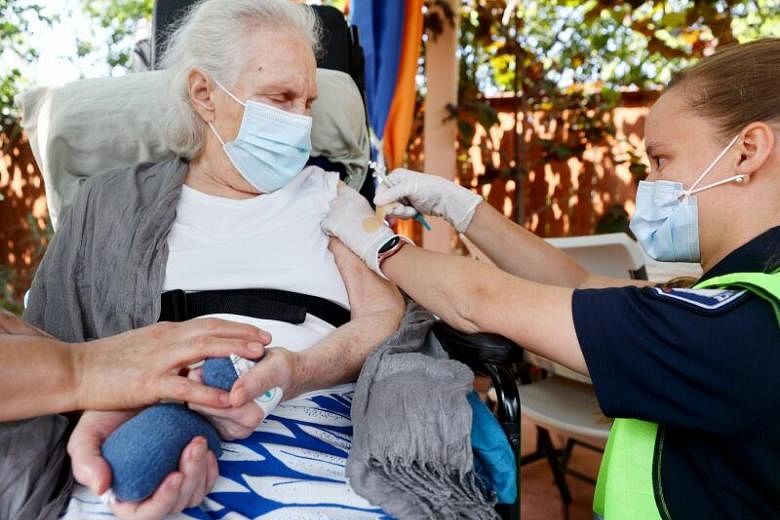WASHINGTON - In February, District of Columbia (DC) health authorities monitoring Covid-19 cases and vaccinations ward by ward in the United States capital were worried about older people being unable or unwilling to be vaccinated against the disease.
The solution? Basic, low tech, common sense public health: Send out an army of volunteers to literally go door to door to persuade people to get vaccinated. Plus, make sure vaccines were actually available, and in accessible locations.
There are incentives too, across the country, for getting vaccinated - a free doughnut perhaps, or a free beer. Several big companies - like supermarket chain Krogers - gave cash bonuses or a day's pay to employees who got themselves vaccinated.
Last month in Maine, residents with proof of vaccination could choose from a free fishing or hunting licence, a wildlife park or state park pass, a US$20 (S$27) store gift card, or admission tickets to baseball games and speedway races.
Still the key element in getting vulnerable seniors, in particular, to vaccinate was house-to-house calls.
The capital in some ways is a microcosm of the US; west of the Anacostia River are the iconic buildings of Washington, but east of the river where the majority are people of colour - mostly African American - lie the city's poorest areas. In February, Ward 3, west of the river, had a 50.4 per cent vaccination rate. In Ward 8, east of the river, the rate was 21.4 per cent.
Older residents especially often did not have the will or the means to travel long distances to get vaccinated. Many did not have adequate information. An issue with seniors has been unfamiliarity with smartphone technology. East of the river, one-third of residents did not have any Internet connection. Smartphone apps were not part of the vocabulary.
Health workers made the rounds explaining the benefits of vaccination, and assuaging doubts and fears. They offered to be "vaccine buddies" - calling up individuals to remind them of their appointments, and even accompanying them to the vaccination site.
Last month, D.C. Mayor Muriel Bowser's administration said it would expand an existing US$51 gift card offering to people who help a friend or family member to receive a dose.
Similar tactics have been deployed in other states, with local authorities in many cases partnering with civil society organisations.
In Shreveport, Louisiana, volunteer Charlene Voorhies works with the Vaccine Equity Project, an initiative to increase vaccination rates among least protected communities. She has been knocking on doors for days.
"I think that's what makes the difference - that personal attention when someone comes to your door to say, 'you're my neighbor and I care enough about you and our neighborhood. And I'm willing to take the time to come to you,'" she told the journal Verywell Health.
The US also got vaccines out proactively to where seniors lived, says Dr Emily Largent, Assistant Professor of Medical Ethics and Health Policy at the University of Pennsylvania, and a Senior Fellow at the Leonard Davis Institute of Health Economics. Having vaccines available free of charge for walk-ins at drug store chains has helped.
In New York as well, health volunteers went door to door. "Good education - that if one has co-morbidities (other illnesses or underlying conditions) one is at greater risk - is critical" Dr Largent told The Straits Times. "That kind of outreach is critical."
"And you need the right people carrying the message," she added. Personal physicians trusted by their patients, had played a key role in this. "A lot of the solutions are low tech, basic public health practices," she said.
And they work. Currently the national vaccination rate is at around 70 per cent. Certainly, there are significant differences across the country, and the rate of new vaccinations is slowing, and new infections are ticking up.
But, according to the Kaiser Family Foundation which tracks vaccination rates, 85 per cent of the population aged 65 or older, has been fully vaccinated.












